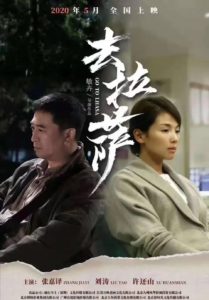City in the Air
空中之城
China, 2021, colour, 16:9, 100 mins.
Director: Minhui 敏卉 [Xing Minhui 邢敏卉].
Rating: 7/10.
Sensitively drawn portraits of dissatisfied lives marks a strong return by Shanghai-born film-maker Xing Minhui.
Chengdu city, Sichuan province, southwest China, the present day. Lu Baicheng (Zhang Jiayi) works late as a barman every evening; at home he has a wife, Li Hailing (Yang Hua), who is mentally ill and cannot stop singing loudly in her room whenever she forgets to take her medication. Lu Baicheng is always calm and tolerant, though less so his daughter Lu Lingshan (Fu Mei) and teenage son Lu Lingjie (Luo Lanshan), 17. Elsewhere in the city, music teacher Bai Rong (Liu Tao), the wife of wealthy businessman Ma Yaoming (Lei Han), has a hospital checkup for amenorrhoea but the doctor can find no obvious cause. She already has a young son, Ma Ranran (Liu Xinyi). Soon afterwards, the family attend the funeral of Ma Yaoming’s mother, Lu Xiuqin (Hu Bianqiu). Now alone, his father, retired soldier Ma Yingxiang (Xu Huanshan), starts behaving erratically, one day losing his way in town. His daughter, Ma Liming (Chen Wei), arranges a fulltime carer for him, a jolly local called Zhaodi (Ma Sise), but initially he resents her organising his life. One day Lu Baicheng’s wife has a fit and is taken to hospital by police for checks; to his sister’s annoyance, Lu Lingjie claims he didn’t hear her as he was listening to music. Bai Rong starts getting increasing attacks of paranoia, as the day nears for the family’s emigration to Canada; one day, suspecting her husband is having an affaire, she follows his car to a block of flats. Lu Baicheng’s corner hairdresser, Zhen (Wang Qian), comes to his bar one evening and makes another play for him; he asks her whether she knows of any jobs going, as Lu Lingjie has just thrown in his job as a delivery boy; she recommends a job manning a tiny gift shop way out of the city. Afterwards, Zhen is almost successful in finally seducing Lu Baicheng, but he suddenly leaves when the TV plays his wife’s favourite song. After Zhaodi saves Ma Yingxiang from drowning in the bath one evening, relations between the two improve a lot. Lu Baicheng and his children visit Li Hailing in the care home but, despite initial appearances, she’s still not sane. Later, at work, Lu Baicheng is made redundant by the bar’s owner (Liu Xiaomin). By chance, Bai Rong meets an old friend from music school, Wang Xiaomei (Wang Yiwei), who’s now a professional violinist; they talk about fellow student Tian Meng, whom Bai Rong used to date, and Wang Xiaomei says he’s living in Lhasa, Tibet province, after falling in love with the place. In the countryside, Bai Rong and her husband visit a hot-air balloon tourist attraction that his company has invested in; Bai Rong accidentally floats off in it and finally lands next to the gift shop manned by Lu Lingjie; as the last bus has gone, he takes her to a place where he knows a tent is; as they talk, Lu Lingjie reveals his background to her and they find they both share a dream of escaping their present lives and going to Lhasa. Meanwhile, Ma Liming makes a surprising discovery in her father’s flat while he’s out tending his late wife’s grave.
REVIEW
More than a decade after her debut, Stand Up 站起来 (2009) – a light drama about a crippled worker’s struggle to get compensation – Shanghai-born film-maker Xing Minhui 邢敏卉 (again using just her given name, Minhui 敏卉) returns with her second feature, City in the Air 空中之城, a sophisticated blending of three tales centred on loss, dreams and escape. Set in Chengdu, the capital of Sichuan province, and strongly cast and beautifully mounted, it unfortunately made no impression at the Mainland box office this spring (a tiny RMB1 million) but still ranks as one of the fresher Chinese films to emerge so far this year.
A “script supervision” credit goes to Mei Feng 梅峰, a longtime writer for director Lou Ye 娄烨, as well as writer-director of the impressive Mr. No Problem 不成问题的问题 (2016); but Xing herself takes solo credit for the screenplay, which opens gradually and only slowly reveals its greater architecture. Lu Baicheng is a middle-aged barman whose ready smile and tolerant nature masks a troubled home life: his wife is mentally ill, his 17-year-old son is a hopeless drifter, and his more focused daughter is sharp-tongued about her younger brother. The viewer next meets Bai Rong, the wife of a wealthy businessman, who has a hospital checkup for amenorrhoea and seems to suffer from attacks of paranoia, especially concerning her husband’s fidelity; she, her husband and young son are about to emigrate to Canada. This story then slides into the third one, in which the husband’s father, suddenly left alone by his wife’s death and subject to lapses of memory, is assigned a young carer whom he initially dislikes (being an old soldier, set in his ways) but then forms a bond of friendship with.
 It only becomes clear around the 30-minute mark that the film is a group portrait, cutting from one story to another as they develop individually and finally, around the 55-minute point, actually intersecting as Bai Rong and Lu’s teenage son meet by chance (in an irreal sequence that nevertheless fits their story) and find they share the same dream of escape. The title of the film when originally scheduled for release a year ago was Go to Lhasa 去拉萨 (see poster, left), and the spectre of the remote Tibetan capital hangs over the film from the start – in the song that Lu’s mad wife obsessively keeps singing and is also sung in Lu’s bar, in Bai Rong’s chance meeting with a violinist friend where she hears news about a former boyfriend, in a surprise confession by Lu’s son, and in the old soldier’s memories of his beloved wife whom he met when they were both PLA soldiers there. The “city in the air” (at 3,600 metres, one of the highest in the world) represents a dream-like refuge for some, an eternal memory for others, and a sense of loss for both.
It only becomes clear around the 30-minute mark that the film is a group portrait, cutting from one story to another as they develop individually and finally, around the 55-minute point, actually intersecting as Bai Rong and Lu’s teenage son meet by chance (in an irreal sequence that nevertheless fits their story) and find they share the same dream of escape. The title of the film when originally scheduled for release a year ago was Go to Lhasa 去拉萨 (see poster, left), and the spectre of the remote Tibetan capital hangs over the film from the start – in the song that Lu’s mad wife obsessively keeps singing and is also sung in Lu’s bar, in Bai Rong’s chance meeting with a violinist friend where she hears news about a former boyfriend, in a surprise confession by Lu’s son, and in the old soldier’s memories of his beloved wife whom he met when they were both PLA soldiers there. The “city in the air” (at 3,600 metres, one of the highest in the world) represents a dream-like refuge for some, an eternal memory for others, and a sense of loss for both.
Xing’s script doesn’t push this side of the drama, and instead focuses more on the main characters’ day-to-day lives, shown in glimpses and shaded with small hints of dissatisfaction. The nicely drawn friendship between the old soldier (Xu Huanshan 许还山, White Deer Plain 白鹿原, 2012, Full Circle 飞越老人院, 2012) and his young, uneducated but jolly carer (Yi minority actress Ma Sise 马斯瑟); that between the young wife (TV actress Liu Tao 刘涛, 42, beautiful and remote) and Lu’s teenage son (Luo Lanshan 罗蓝山, 27, the young runaway in the final episode of A Touch of Sin 天注定, 2013); the putative romance between the self-effacing Lu (Zhang Jiayi 张嘉译, good as always) and a middle-aged woman (Wang Qian 王茜) who runs the corner hairdresser’s – all of these relationships are sensitively developed but suddenly cut short for one reason or another. Xing’s script is ruthless in showing unnecessary detail, with fade-outs where other directors would fill in more detail and jumps where the viewer is expected to fill in the blanks. It’s a technique she flirted with in Stand Up but comes to full development here as the film lightly visits the various characters’ lives.
Technical credits are good and precise, with Hong Kong’s Yu Liwei 余力为 (d.p. of choice for several arthouse directors, including Jia Zhangke 贾樟柯) producing both striking landscapes and warm interiors, and fluid editing by US documentary editor Alex Ricciardi and the Mainland’s experienced Zhang Yifan 张一凡 (whom Xing also used on Stand Up). For once, a final on-screen quote (in this case from Hermann Hesse’s novel of self-discovery, Siddhartha) seems appropriate rather than pretentious. For the record, Zhang’s character is identified as Lu Baicheng 陆柏承 in the end credits but Lu Baichen 陆柏辰 in the subtitles.
CREDITS
Presented by Lixing Zhishang (Shenzhen) Culture Media (CN). Produced by Lichao (Shanghai) Film & TV Workshop (CN), Atrio Media (Beijing) (CN).
Script: Minhui [Xing Minhui]. Photography: Yu Liwei [Yu Lik-wai]. Editing: Alex Ricciardi, Zhang Yifan. Music: Zhang Yang. Song: Xiaohe Art (music, vocals), Minhui [Xing Minhui] (lyrics). direction: Weng Yu. Sound: Zhang Yang. Visual effects: Zhao Zixiao, Zhang Lei (Color Up Studio). Executive direction: Long Weihua.
Cast: Zhang Jiayi (Lu Baicheng), Liu Tao (Bai Rong), Xu Huanshan (Ma Yingxiang), Lei Han (Ma Yaoming, Ma Yingxiang’s son/Bai Rong’s husband), Luo Lanshan (Lu Lingjie, Lu Baicheng’s son), Wang Qian (Zhen, hairdresser), Yang Hua (Li Hailing, Lu Baicheng’s wife), Ma Sise (Zhaodi, Ma Yingxiang’s carer), He Yu (Zhao Qiyun, businessman customer in bar), Chen Wei (Ma Liming, Ma Yingxiang’s daughter), Fu Mei (Lu Lingshan, Lu Baicheng’s daughter), Liu Xinyi (Ma Ranran, Bai Rong’s son), Liu Xiaomin (bar owner), Yan Jin (Hong Gang), Li Zhong (policeman), Zhang Xu (Ma Guangming, Ma Yingxiang’s son), Li Yalin (Tan Qiang, Ma Liming’s husband), Wang Yuqi (Ma Liming’s son), Hu Bianqiu (Lu Xiuqin, Ma Yingxiang’s late wife), Guan Juncheng (barman), Chuchu (server in bar), Wang Yiwei (Wang Xiaomei, violinist), Zhao Junjun (nurse), Liang Xiaocui (young Lu Xiuqin), Wang Zheng (Shi, hot-air balloon manager), Tang Huajun (boss of air-con shop), He Lifen (boss lady of majiang cafe).
Release: China, 23 Apr 2021.
